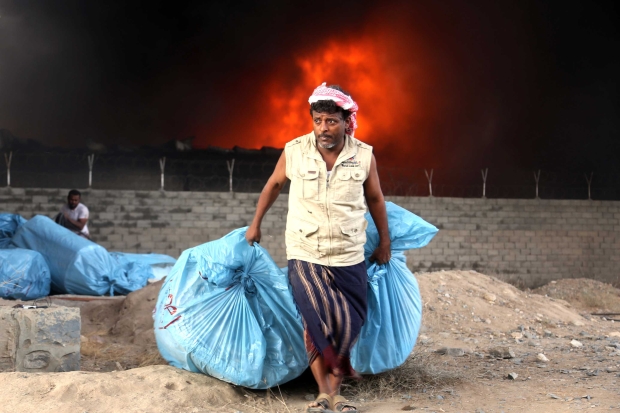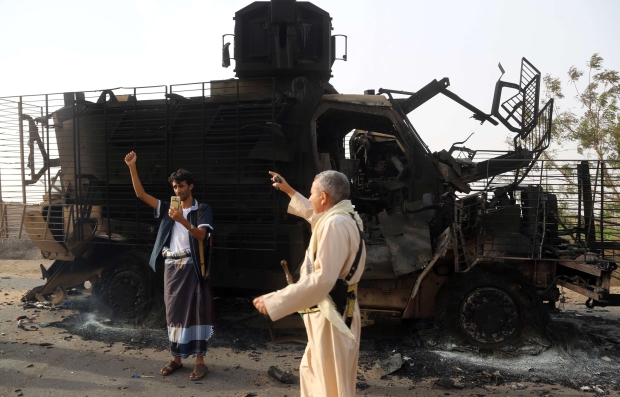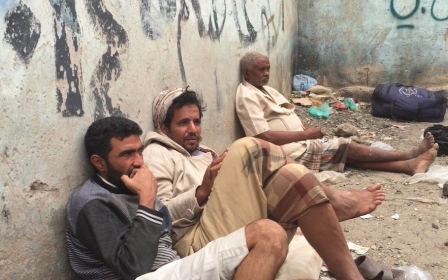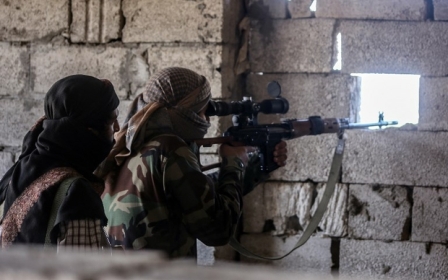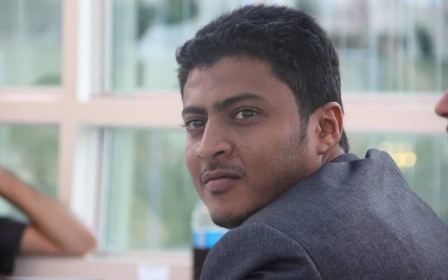How Saudi cash is luring desperate Yemenis onto the battlefield
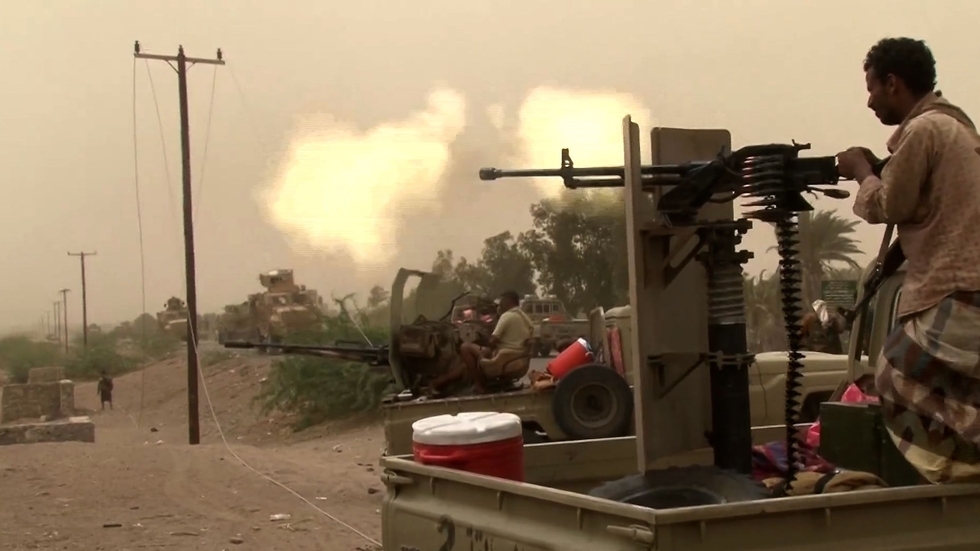
LAHJ, Yemen - Fuad used to be able to hear the planes taking off from the airport close to his home in the al-Rabasah neighbourhood of Hodeidah.
There he eked out a living as a motorcycle courier, supporting his wife, four children and wider family.
But then the roar of jet engines was overtaken by the thunder of war. In March 2018, the battle for Hodeidah began. Saudi-led forces and their allies started their assault on the Yemeni port, a gateway for aid and imports for the country but which has been held by Houthi rebels since 2015.
I felt that I was of little value, depending on people to help me. Then I started to look for work
- Fuad, pro-Hadi fighter
In late June Fuad, who asked that his real name not be used on grounds of safety, sold his motorbike. He and his family then joined some of the other 35,000 families estimated by the UN to have fled the area during the past four months.
First they headed for Ibb province, a 225km six-hour bus journey to a safer region also under the control of the Houthis.
"We stayed inside a temporary camp in Ibb province for two weeks and there was no help from organisations," says Fuad, 39. "There were just some people who have provided us with some food. I felt that I was of little value, depending on people to help me. Then I started to look for work."
The job Fuad was to find would eventually take him back home – but this time without his family.
Fight and become rich
The battle for Hodeidah has been one of the most intense of the three-year Yemen war. It is no place for civilians.
Across the city, snipers' nests, trenches and roadblocks have sprung up. The Houthis have scattered landmines around the city’s outskirts. Pro-Houthi media reported that a coalition air strike hit a bus full of civilians heading for Taiz.
There is currently a relative lull in the fighting - but both sides of the conflict are continuing to send reinforcements to the region.
Forces loyal to President Abd Rabbuh Mansour Hadi need fighters with knowledge of the city's streets and suburbs, airport and roads. Who better than the men who have recently left?
"Some of my friends have already joined the battle of Hodeidah with pro-Hadi forces," Fuad said, "and they receive SR 4,000 ($1,065) per month, so they recommended a good broker."
Compare that to the $120 that Fuad used to get from his courier work or the $60 a labourer in Hodeidah would expect to earn.
But reaching the camp was to prove another problem. The Houthis would not let Fuad leave Ibb and enter pro-Hadi territory, despite his attempts to persuade them that he was going to work with old friends.
The camp consists of makeshift tents which offer no shelter from the rain and become overheated under the midday sun. The howl of the wind drowns out the sound of children at play
"Finally, a friend told us that there are smugglers transporting people via mountains and valleys," he says.
The trip cost $60 and took eight hours, taking the family along hidden routes, often on foot, to bypass Houthi checkpoints.
On 8 July, Fuad and his family arrived at a camp in Lahj's al-Ribat desert which houses around 120 families from Hodeidah.
Constructed in late June, the site is supervised by pro-Hadi soldiers and consists of makeshift tents which offer no shelter from the rain and become overheated under the midday sun. The howl of the wind drowns out the sound of children at play. There is little food: other essentials including sanitation and clean water are scarce.
But it is safe.
Seductive salaries for key battles
Once Fuad knew that his family were secure, he called a broker who recruits men to fight in Hodeidah and quickly cut a deal to fight for three months.
Jamail, a major with the Yemeni army in Lahj province, is tasked to recruit men like Fuad (he asked his real name not be given as he is not authorised to speak publicly).
“The displaced people of Hodeidah hope to liberate their province from the Houthis," he said. "They’ve risked travelling to liberated areas so they can go and join the battle of Hodeidah.
The new recruits do not receive military training before they head out. Instead they rely on the knowledge that most Yemeni men have of how to handle firearms (the country has one of the highest gun ownership rates in the world). The rest they have to learn on the battlefield.
In early July, pro-Hadi forces in Hodeidah announced that 7,000 new recruits from the city had joined that battle and other fighters had joined before that in several batches. Jamail said that hundreds of displaced people from Hodeidah had already headed back in July, with hundreds more like Fuad joining the fight later in the month.
Fuad plans on fighting for three months, then using that money to come home and rent a family home in Aden province.
The fighter in Hodeidah receives more than $1,000 while the fighter in Taiz only receives $120
- Othman, pro-Hadi fighter
The rewards for fighting the Houthis are rich on Yemen’s bloodiest battlefields. But that does not mean men enjoy what they are doing.
Othman, a pro-Hadi fighter, began fighting in Saada last year, but stopped in March as he hated fighting. He said that the pro-Hadi forces pay the seductive salaries only for the dangerous battles.
"The fighter in Hodeidah receives more than $1,000 while the fighter in Taiz only receives $120. The main reason is that the battle in Hodeidah battle is very dangerous and crucial for pro-Hadi forces. So they pay seductive salaries to encourage people to join.
"These desperate displaced people are victims twice, once when they flee their houses and then when they join the battle."
Fadhl Mohammed, a professor of sociology in Taiz University, said that the poverty of the displaced was, in effect, fuelling the conflict.
"We don’t see rich people fighting on the frontlines as they are too busy enjoying their lives. It’s only desperate people who join the battles with hope of a better life."
The lesser of two evils
Fuad heads back north to Hodeidah on 25 July, where it is expected he will fight near the rear of the airport site, away from his old neighbourhood
Neither he nor his family want him to go, but he is thinking of the future, of saving enough money through fighting to be able to rent a family home in Aden.
Some people have two choices. Either to see their children starve to death inside camps or to join the battles. So they prefer to fight to save their children
- Fuad, pro-Hadi fighter
"Fighting is the best choice for me because I will get money that will enable me to help my family. If I am killed then the government will help my family. I do not like to beg people to help me."
“Some people have two choices,” he says. “Either to see their children starve to death inside camps or to join the battles. So they prefer to fight to save their children."
But he still has his doubts, as do his family, who only backed his choice when they heard that he would be going with friends. Above all else, he fears that he will never see his wife and children again.
"Even if I get money from fighting, it is still not any better than my previous life," he says.
“Working on my motorcycle is better than fighting for money. I still long for my neighbourhood and the safety of my previous job.”
New MEE newsletter: Jerusalem Dispatch
Sign up to get the latest insights and analysis on Israel-Palestine, alongside Turkey Unpacked and other MEE newsletters
Middle East Eye delivers independent and unrivalled coverage and analysis of the Middle East, North Africa and beyond. To learn more about republishing this content and the associated fees, please fill out this form. More about MEE can be found here.


